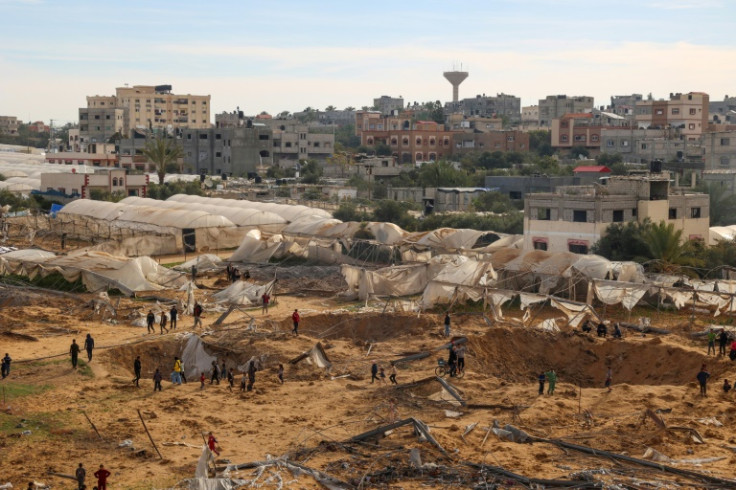
Israel faced growing international pressure on Tuesday to agree to a ceasefire with Hamas, as it prepared for an incursion into the southern Gaza city Rafah where more than a million Palestinians are trapped.
CIA Director William Burns was due in Cairo on Tuesday for a new round of talks on a Qatari-brokered ceasefire proposal that would temporarily halt fighting in exchange for Hamas freeing hostages.
His planned visit comes after Washington and the United Nations warned Israel against carrying out a ground offensive into Rafah without a plan to protect civilians, who say they have nowhere left to go.
"Wherever we go there's bombing, martyrs and wounded," said Iman Dergham, a displaced Palestinian woman.
After White House talks with Jordan's King Abdullah II on Monday, US President Joe Biden said civilians in Rafah "need to be protected".
"Many people there have been displaced -- displaced multiple times, fleeing the violence to the north, and now they're packed into Rafah -- exposed and vulnerable," he said.
King Abdullah pushed for a full ceasefire to end the four-month-old war.
"We cannot afford an Israeli attack on Rafah. It is certain to produce another humanitarian catastrophe," he said. "We need a lasting ceasefire now."
China urged Israel to "stop its military operation as soon as possible... in order to prevent a more serious humanitarian disaster in the Rafah area".
After rejecting Hamas's terms for a truce last week, Israel conducted a predawn raid in Rafah on Monday that freed two hostages and killed around 100 people.
Netanyahu hailed the operation that freed Fernando Simon Marman, 60, and Luis Har, 70, as "perfect", while the Palestinian foreign ministry said the deaths of dozens of Gazans amounted to a "massacre".
The rare rescue mission came hours after the Israel premier spoke with Biden, who reiterated his opposition to a major assault on Rafah.
Netanyahu rebuffed Israel's key ally, insisting that "complete victory" cannot be achieved without the elimination of the militants' last battalions in Rafah.
The United States has angered some Middle East allies by repeatedly refusing to back a full ceasefire, with Washington saying it supports Israel's drive to eradicate Hamas and calling for shorter pauses with hostage-prisoner swaps instead.
Biden said Monday his administration was trying to broker a six-week truce and, that while key elements were in place, "gaps" remained.
Once the warring parties agree to the ceasefire, "something more enduring" could be broached, Biden said.
Rafah has become a last refuge for over half of Gaza's population, who are pressed up against the Egypt border in makeshift camps where they face outbreaks of hepatitis and diarrhoea, and a scarcity of food and water.
Netanyahu has said Israel will provide "safe passage" to civilians trying to leave, but foreign governments and aid groups -- as well as Gazans -- questioned where they could go.
"As it is, there is no place that is currently safe in Gaza," said United Nations spokesperson Stephane Dujarric.
When asked about an evacuation mission, he said the UN would "not be party to forced displacement of people".
The UN's human rights chief Volker Turk warned that "an extremely high number of civilians" would likely be killed or injured in a full Israeli incursion into Rafah, which could also spell the end of the "meagre" humanitarian aid entering Gaza.
According to the Food and Agriculture Organization, more Gazans are being pushed to the brink of famine each day, with all 2.2 million people in the territory in the UN agency's three most severe categories of hunger.
"We're almost out of flour in the north," said a man in north Gaza's Beit Lahia. "We can't even find food and drinks for the children."
Israel's operation to free the two hostages left Rafah with bomb craters and piles of rubble.
Footage of the overnight operation released by the Israeli military appeared to show just over a dozen soldiers entering a building on foot and extracting the hostages, who were described as being in "good and healthy" condition.
A spokesperson for Netanyahu's office said it had involved "a prolonged battle", during which "dozens of Hamas targets were attacked from the air".
International Criminal Court chief prosecutor Karim Khan said he was "deeply concerned by the reported bombardment".
The US State Department also called on Monday for Israel to investigate the "heartbreaking" death of six-year-old Gazan Hind Rajab.
Her body was recovered on Saturday along with two relatives and two Red Crescent workers who went to find her after her family's car came under fire while trying to flee an Israeli advance in Gaza City.
At least 28,340 people, mostly women and children, have died in Israel's relentless bombardment and ground offensive in Gaza, according to the Hamas-run health ministry.
The Israeli military said Tuesday that three more of its soldiers had been killed in fighting in Gaza, taking its losses since ground operations began on October 27 to 232.
Militants also took around 250 people hostage, around 130 of whom are still in Gaza, according to Israeli figures. Israel says 29 of the remaining captives are presumed dead.




